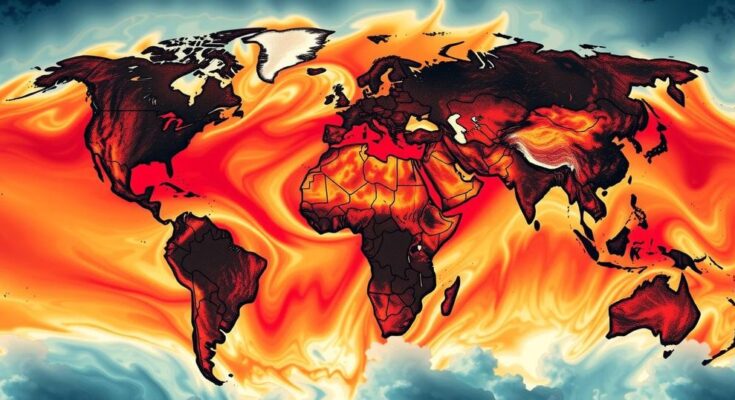In 2024, global temperatures exceeded 1.5 degrees Celsius for the first time, marking it as the hottest year on record. Climate change impacts are manifesting worldwide, prompting urgent calls for action under the Paris Agreement as political will wanes in some countries, notably with the incoming US President Donald Trump labeling climate change a hoax.
In 2024, global temperatures have officially surpassed the critical threshold of 1.5 degrees Celsius above pre-industrial levels, marking a historic milestone as it becomes the warmest year on record, as reported by the European Union’s Copernicus Climate Change Service (C3S). The average temperature reached 1.6 degrees Celsius above the norms of 1850-1900, exceeding the previous record set in 2023 by more than 0.1 Celsius. This alarming trend continues to illustrate the impact of climate change, as the past decade has been the hottest in recorded history, with each year contributing to these rising temperatures.
The 2015 Paris Agreement aimed to curtail global warming to below 1.5 degrees Celsius to mitigate severe climate repercussions. Although surpassing this milestone does not violate the agreement, it signals approaching peril as fossil fuel emissions persist in heightening atmospheric temperatures. The consequences of such climate changes are becoming increasingly evident, with extreme weather events manifesting across the globe.
In 2024 alone, devastating wildfires in California claimed several lives and destroyed numerous homes, while Bolivia and Venezuela faced catastrophic blazes. Regions in Nepal, Sudan, and Spain experienced severe flooding, and heatwaves in Mexico and Saudi Arabia resulted in numerous fatalities. With a record high of water vapor reported in the atmosphere, climate change continues to exacerbate storms and deluges, revealing a clear link between temperature and precipitation events.
Despite the growing urgency for action, support for emission reductions appears to be diminishing in some nations. Newly elected US President Donald Trump has publicly dismissed climate change as a hoax, even in the face of overwhelming scientific consensus on its human-driven nature and its associated risks. Upcoming climate data from US scientists will further illuminate these pressing trends and their implications for our world.
The global climate crisis has been escalating over the decades, driven largely by human activities, particularly the burning of fossil fuels which releases greenhouse gases into the atmosphere. The establishment of the Paris Agreement presented a global commitment to limiting temperature increases and mitigating potential disasters attributed to climate change. As climatologists observe increasingly severe weather patterns, the scientific community emphasizes the urgent need for collective, actionable measures to transition away from fossil fuel dependency.
The surpassing of the 1.5 degrees Celsius threshold in 2024 serves as a significant warning about the escalating climate crisis. While this moment marks the first recorded instance of average global temperatures exceeding this pivotal limit, it necessitates a renewed commitment from world leaders to adhere to the goals established in the Paris Agreement. The alarming rise in temperature correlates with intense weather events that can no longer be ignored; immediate and urgent action is essential to combat the ongoing impacts of climate change.
Original Source: www.rfi.fr




